Make this Manchester Tart without Bananas, as not everyone loves them. They can also turn a little brown after a while, so why not leave them out? Or use dried bananas instead. However, they are generally coated in sugar.

Jump to:
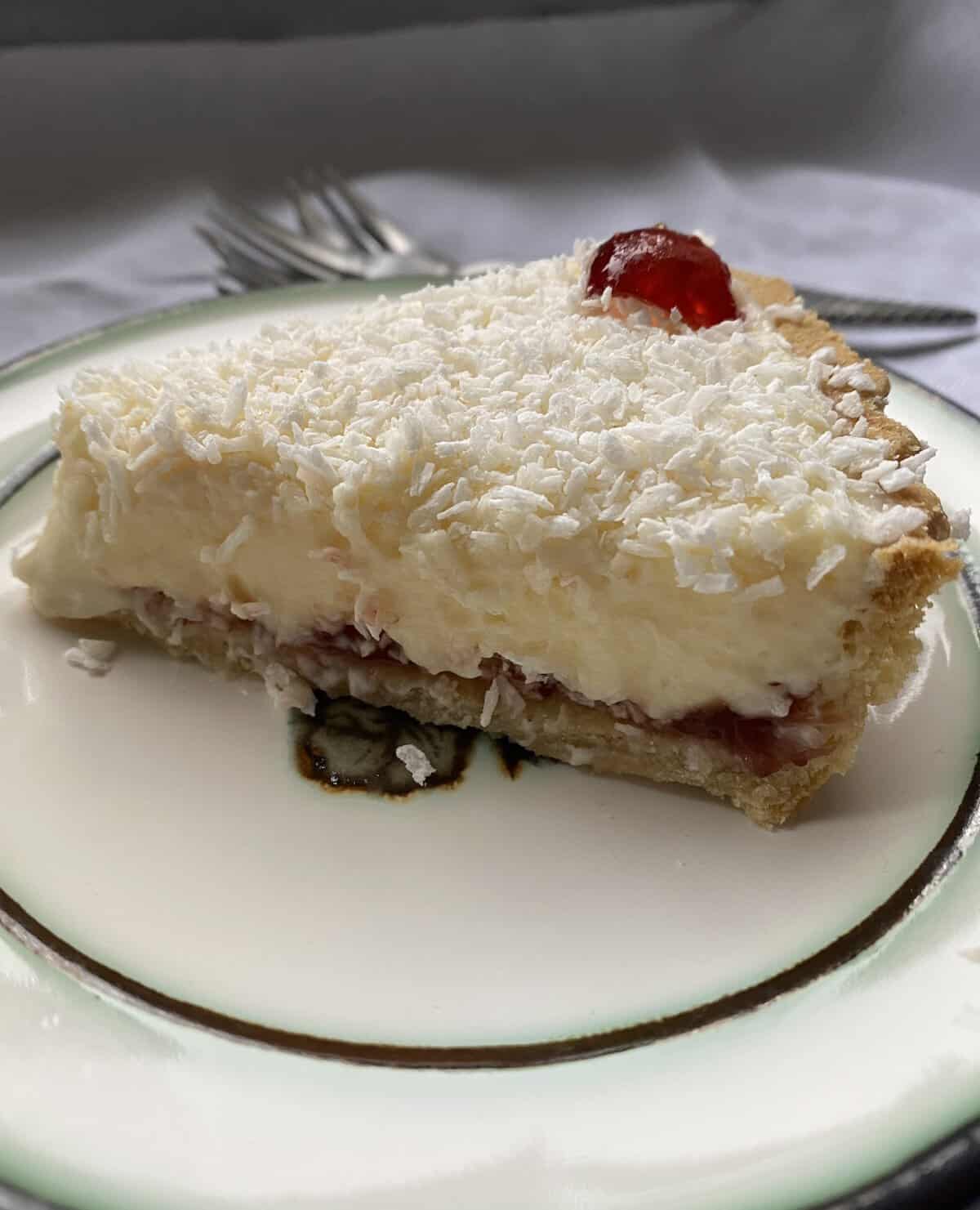
Ingredients
This is an overview of the ingredients I used to make this recipe, with possible alternatives and why I may have used them. A complete list of ingredients and full instructions can be found in the Recipe Card below. Or click the 'Jump to Recipe' button at the top of this post. Tip: Always read through a recipe before you start, to ensure you have all the ingredients and understand the method.
For the All Butter Shortcrust Pastry
- Flour - plain white all purpose flour
- Butter - fridge cold, cut into cubes
- Egg -medium sized, free range and organic if possible
- Cold water. You may not need it all, so don't add it all at once.
For the Thick, Rich Custard
- Milk - full fat whole milk
- Cream - single cream. Double cream is fine. If you don't have enough cream use full fat milk instead.
- Egg Yolks - Free range and organic if possible. Freeze the egg whites to make meringues another day.
- Sugar - caster sugar. Granulated sugar has larger granules and will take longer to dissolve when whisked with the eggs.
- Corn Flour - or corn starch. You could use plain white flour as this is used to thicken the custard.
- Vanilla extract - Have you tried making your own?
For the Filling
- Strawberry Jam - Any thick jam is fine. Raspberry or Rhubarb jam would be a nice alternative.
- Coconut - Desiccated/dried coconut is ideal as it is a small grain. If you don't like coconut, try chopped nuts, or leave it out and decorate the top with more cherries.
- Cherries for decorating - Glacé cherries are fine. Use fresh if they are in season.
Instructions for making a Manchester Tart
Grease a loose bottom 20cm/8inch tart tin or similar, approx 1.25 inch/3.5 cm deep. Make the shortcrust pastry first. This can be resting in the fridge while you make the thick custard. You can also make the custard while the pastry is baking. You can also make everything ahead of time and add the filling the next day.
Make the Shortcrust Pastry
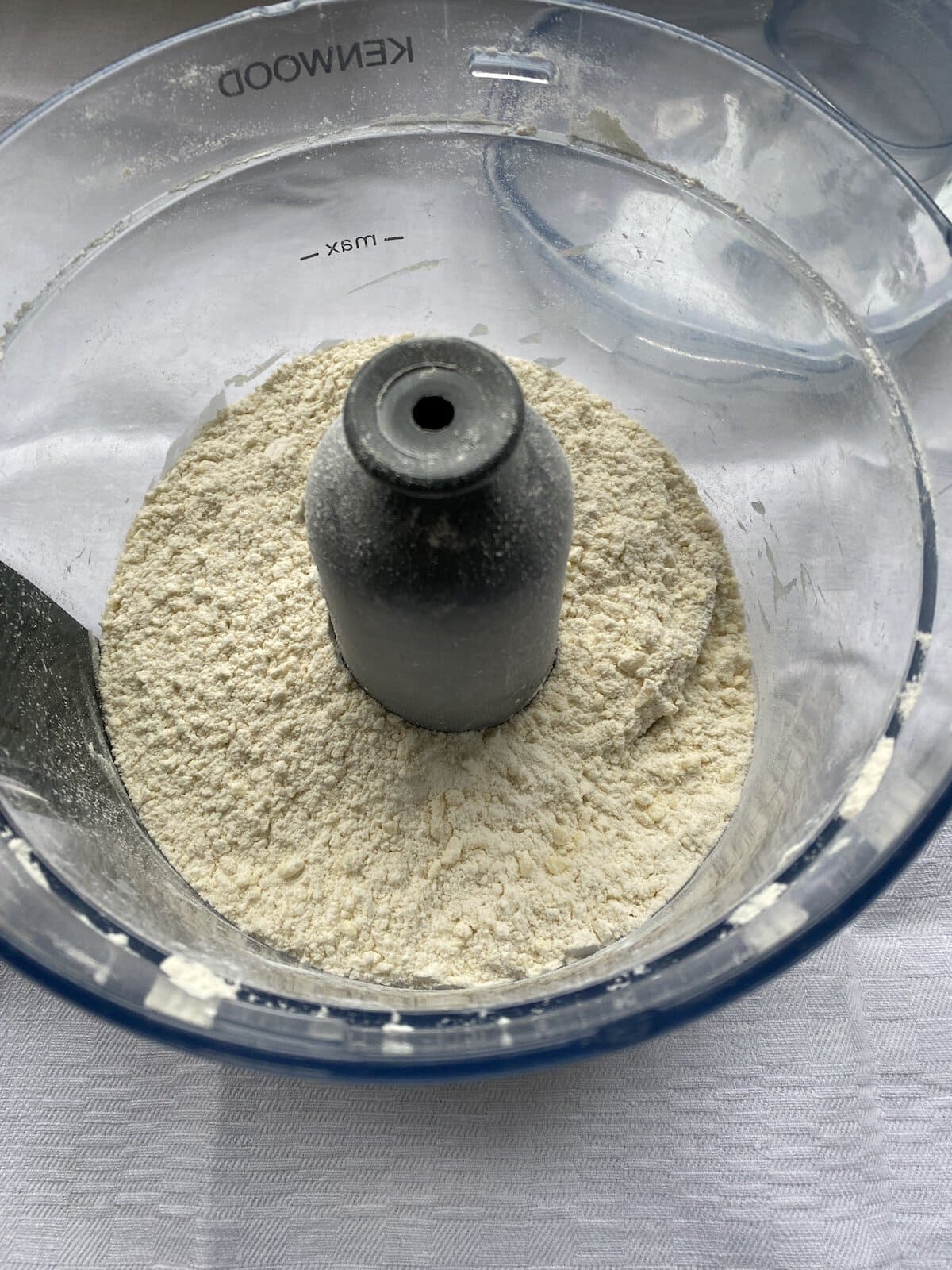
Blitz together the flour and butter in a food processor until you have a fine breadcrumb consistency. Use your fingertips and the 'Rub In' method if you don't have a food processor.

Add the egg and enough water to bring the pastry to a smooth, firm dough.
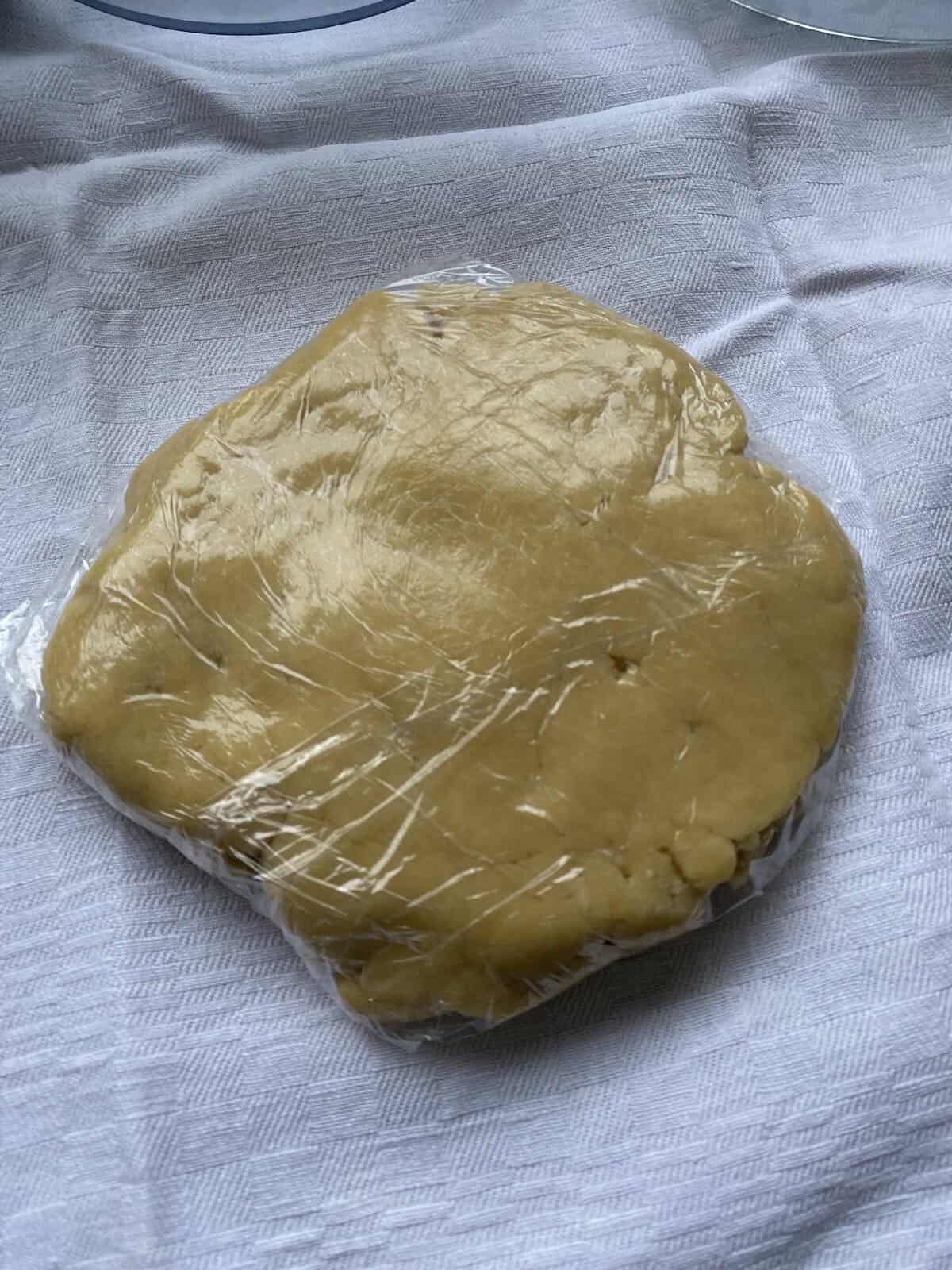
Flatten the dough a little, then wrap it in cling film or baking parchment and place it in the fridge for at least 30 minutes to rest and firm up. TIP: The pastry can remain in the fridge overnight or for a few days if you want to make the tart later.
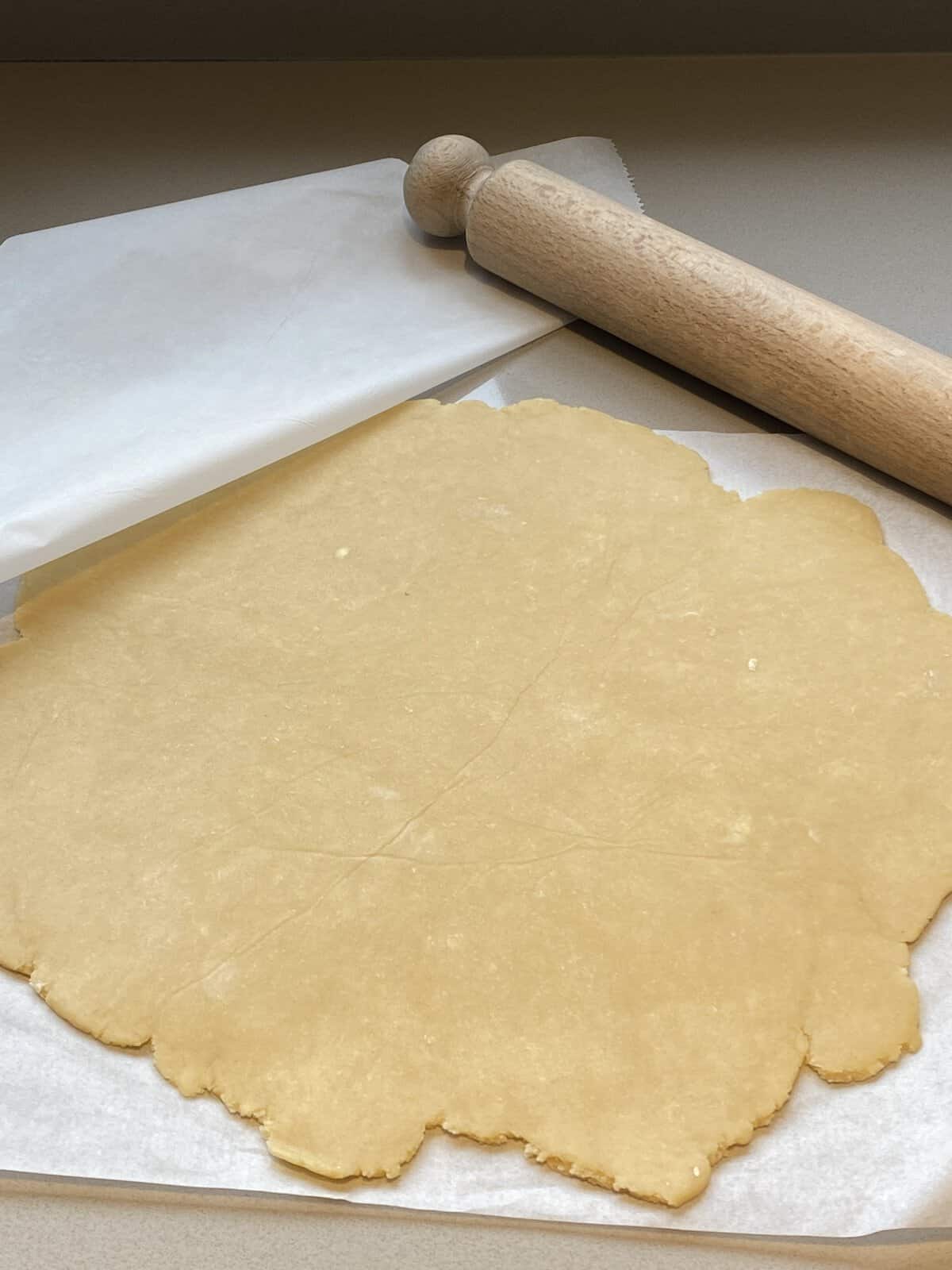
Roll out the pastry between two sheets of baking parchment or a lightly floured surface to fit the size of the tart tin and no more than ⅛th 2-3 mm thick.
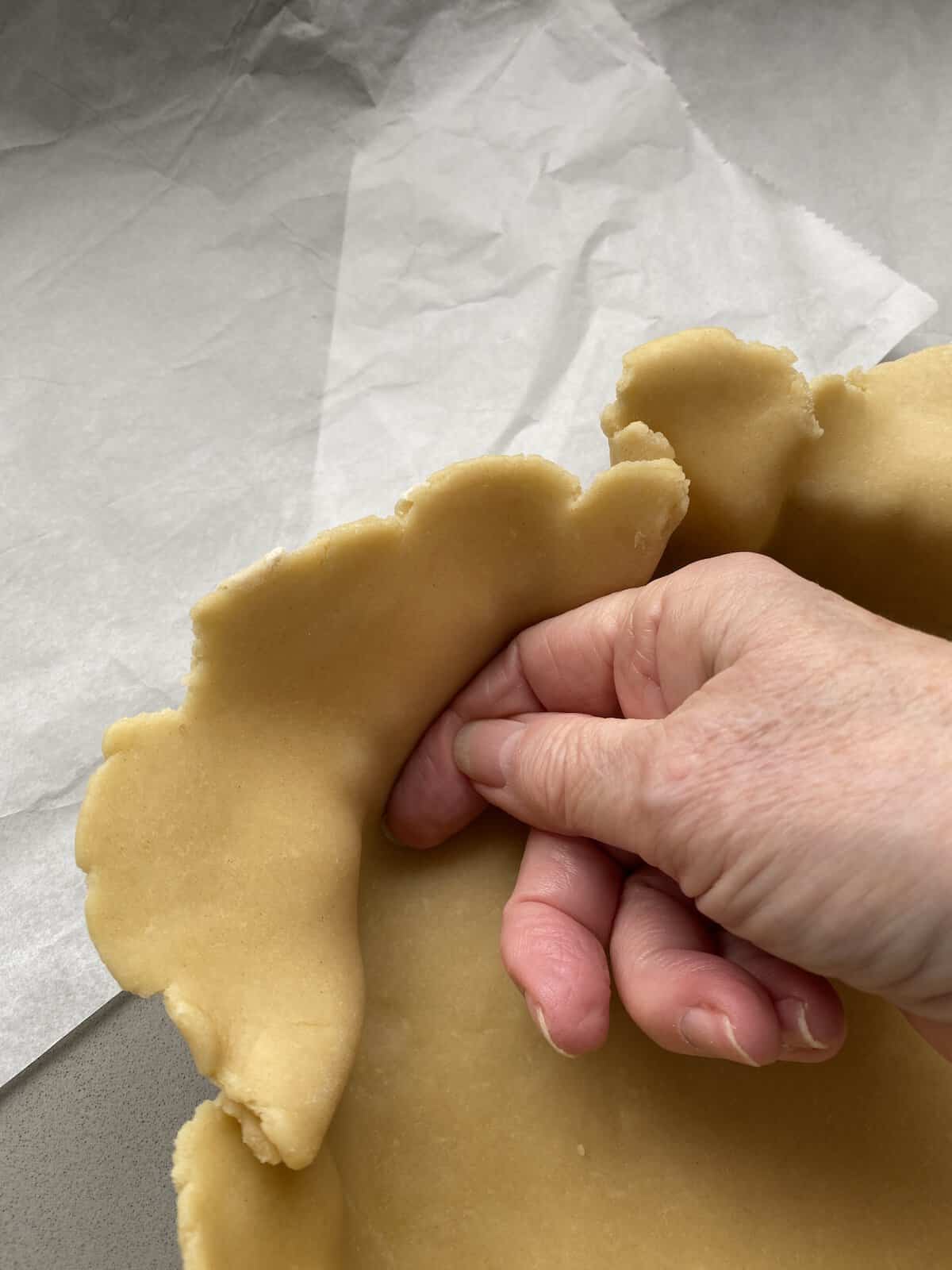
Fit the pastry into the tart tin, using your fingers to get into the corners. Let the pastry overlap the edges.
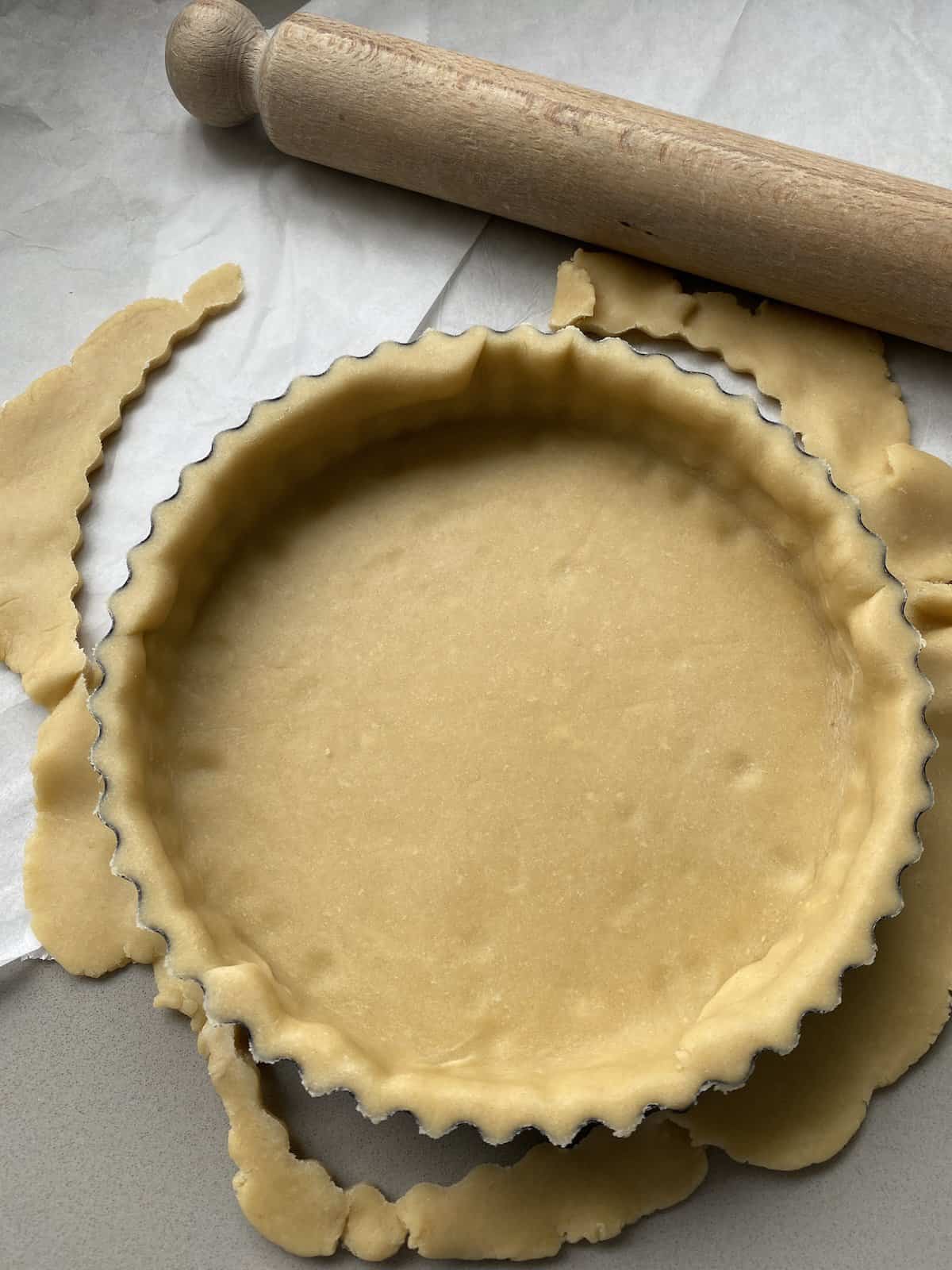
Remove the excess pastry by cutting through the top of the tart tin with your rolling pin. Tip. Wrap and freeze the excess pastry to use another time. Use it as a pie topping or small tarts or pies.
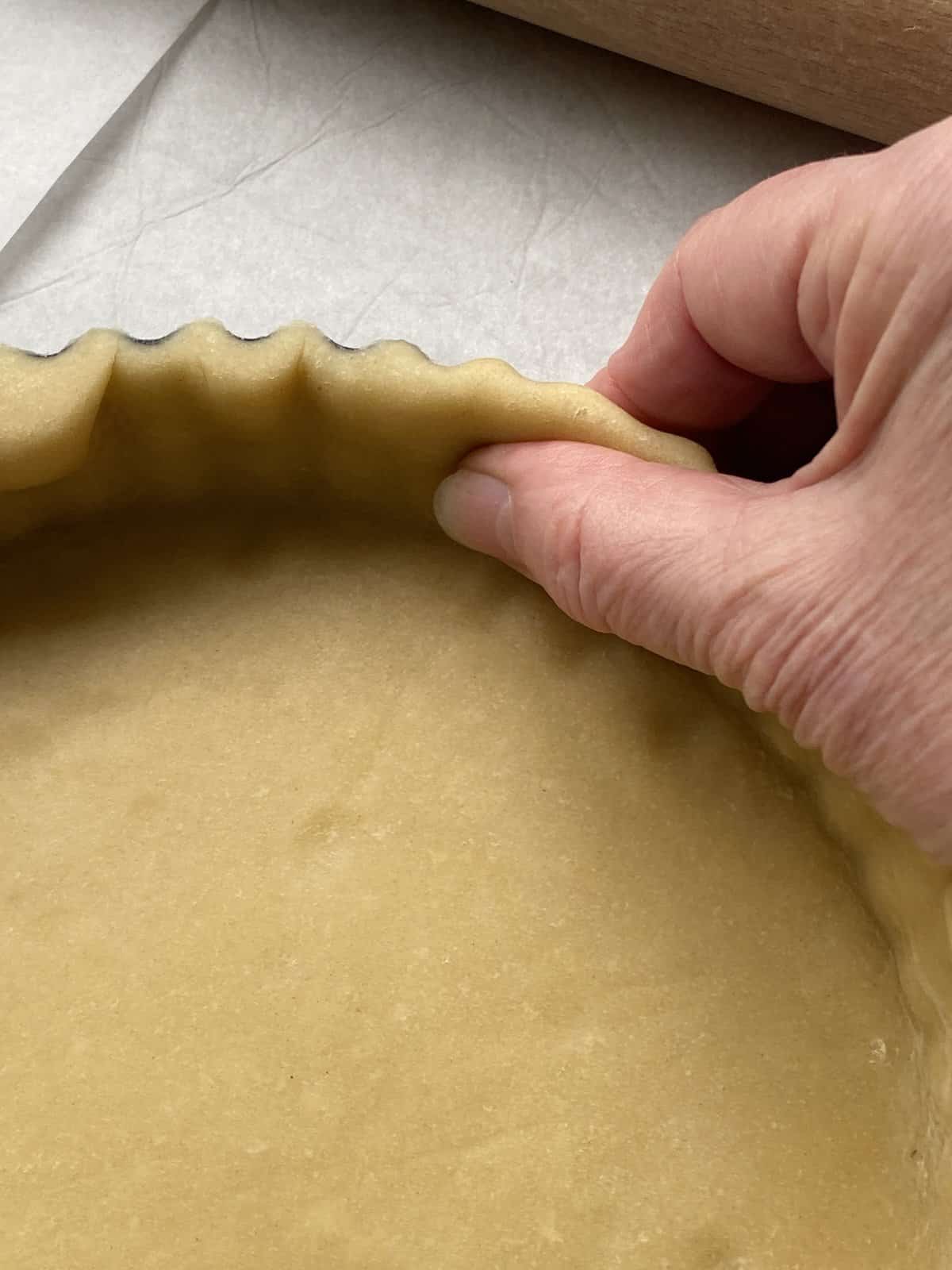
Neaten the edges and sides using your thumb and fingertips, allowing the pastry to lift slightly above the top edges of the tin. This allows for a small amount of shrinkage during baking.
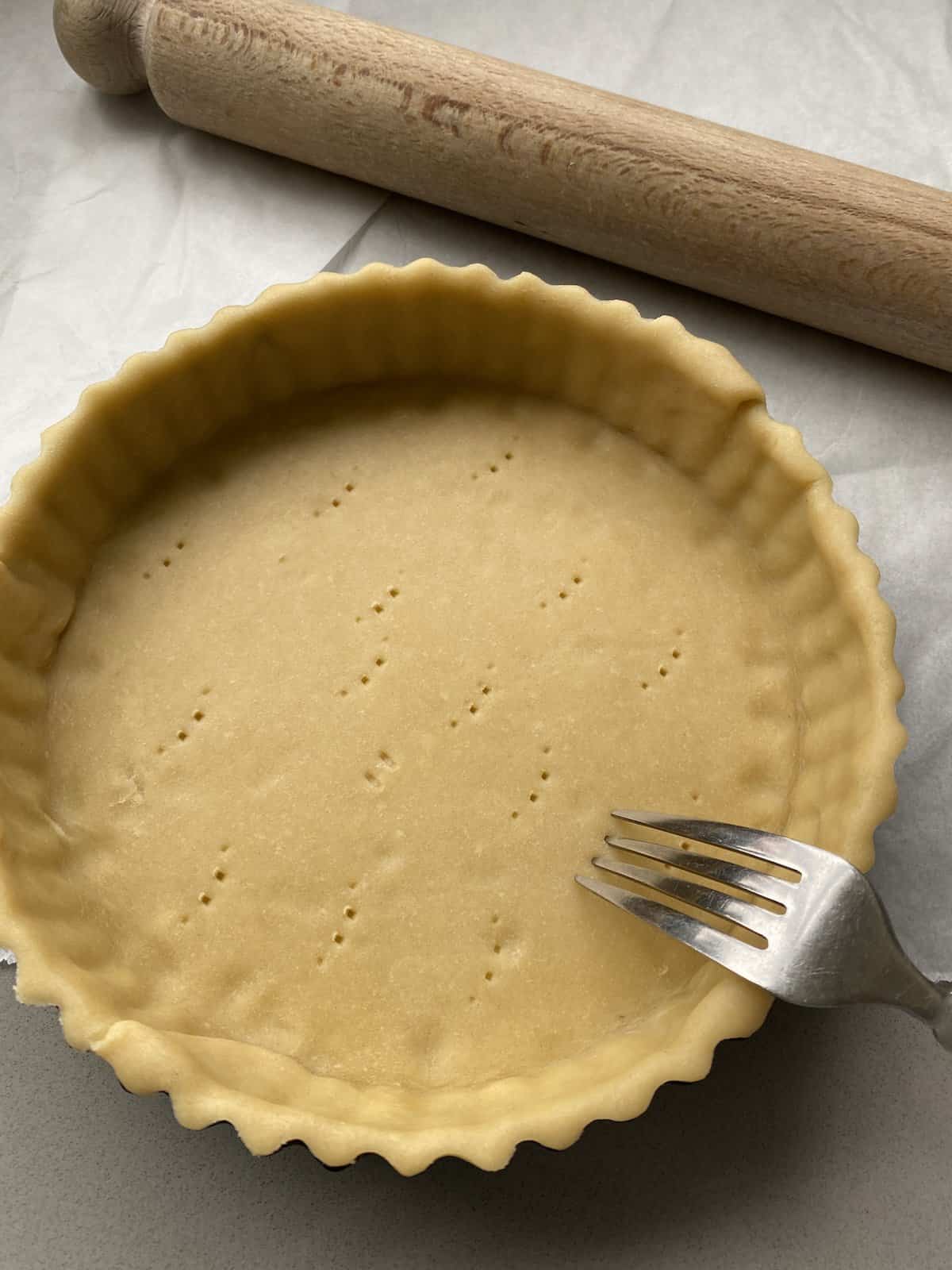
Make small holes, with a fork, in the base of the pastry dough. Cover the pastry with baking parchment and return to the fridge to rest again for about 30 minutes.
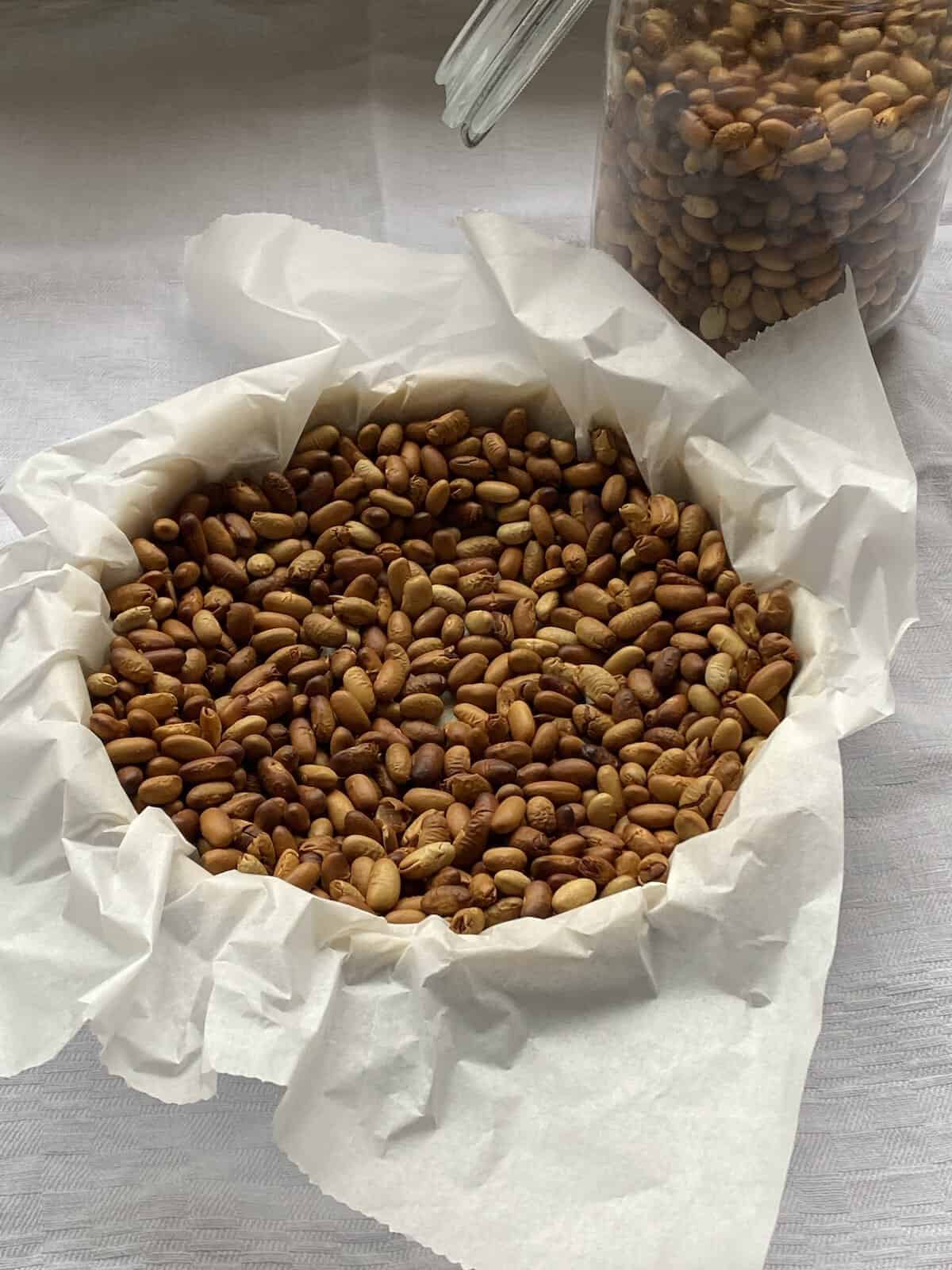
Preheat the oven to 200c in a fan oven and place a baking tray on the middle shelf to heat up.
When ready to bake, remove the pastry case from the fridge and cover the baking parchment with baking beans or dried beans.
Bake on the preheated baking tray for 20 minutes or until the pastry is cooked and feels dry when touched.
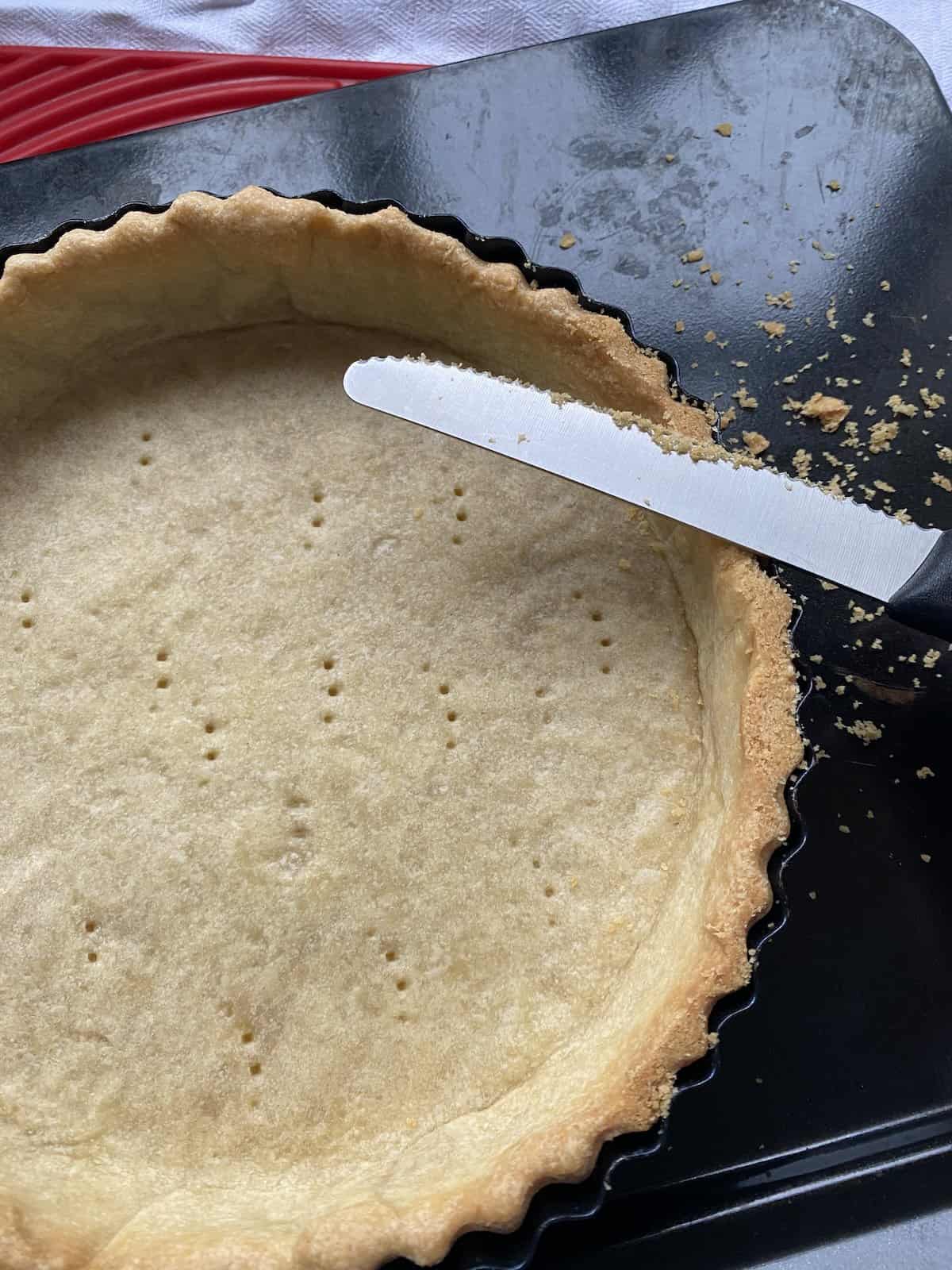
Remove the baking beans and parchment, and return to the oven for a few more minutes until the pastry is slightly golden. Leave in the tin to cool completely.
Pro tip: To neaten the edges further, use a small serrated knife and carefully file away the top edges of the pastry case. Take care not to break any of the tart casing.
Make the Custard Filling
While the shortcrust pastry tart is baking, now is the time to make the thick custard that will be spread over the top of the Manchester Tart before you add the remaining coconut.
- In a large bowl, beat together the egg yolks, sugar and vanilla extract until light in colour. Add the cornflour and mix until well combined.
- Heat the cream and milk to just below boiling point in a small pan, then carefully pour this into the bowl containing the egg and sugar mixture. Mix until well combined.
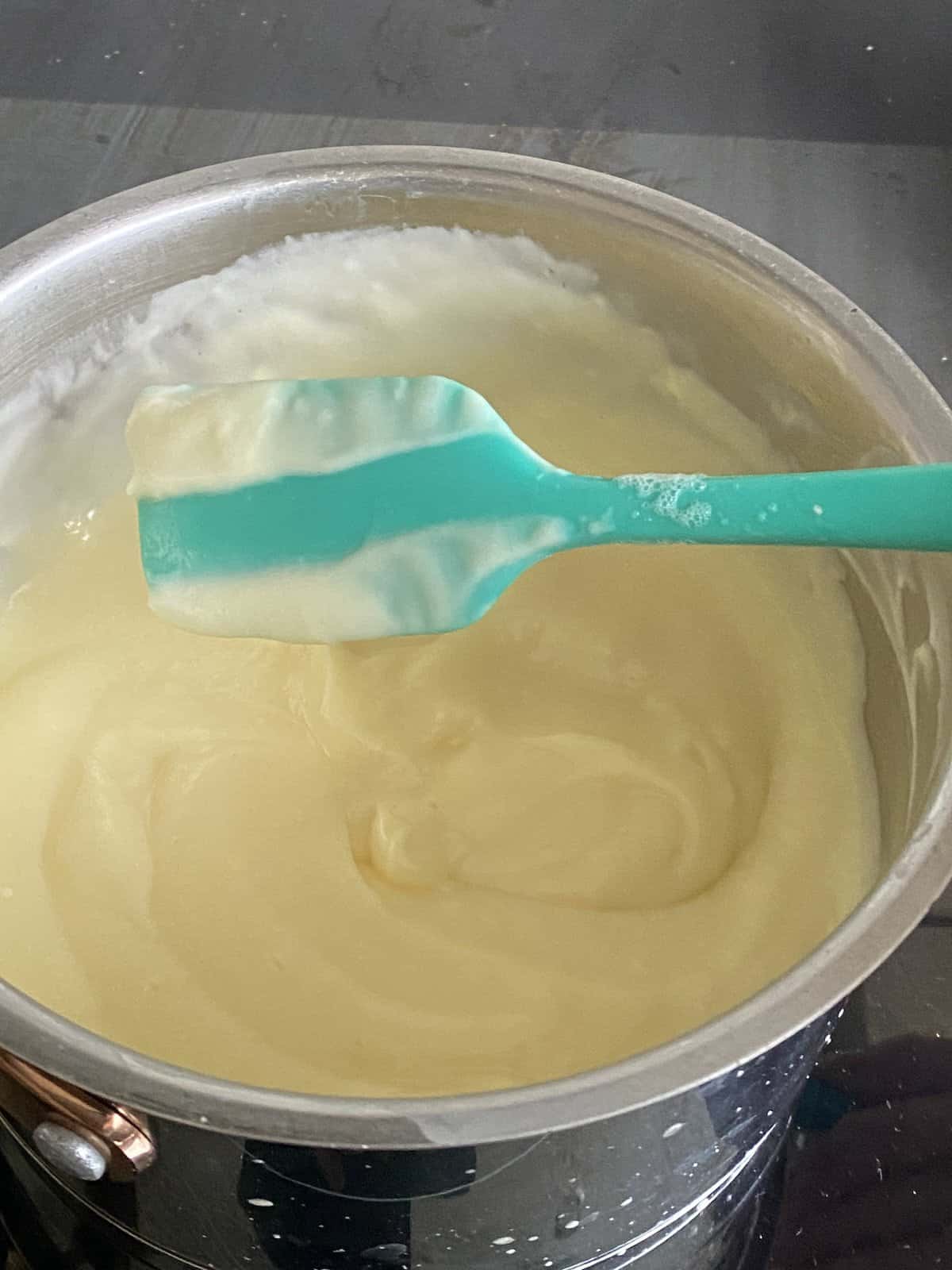
Pour the custard back into a clean pan, stirring continuously with a spatula, and bring the custard slowly to a simmer. It will soon begin to thicken.
As it thickens, take off the heat and stir until you have a smooth custard. If needed, return to the heat to thicken further while stirring continuously.
TIP: Test for thickness by spreading your finger over the back of a spoon.
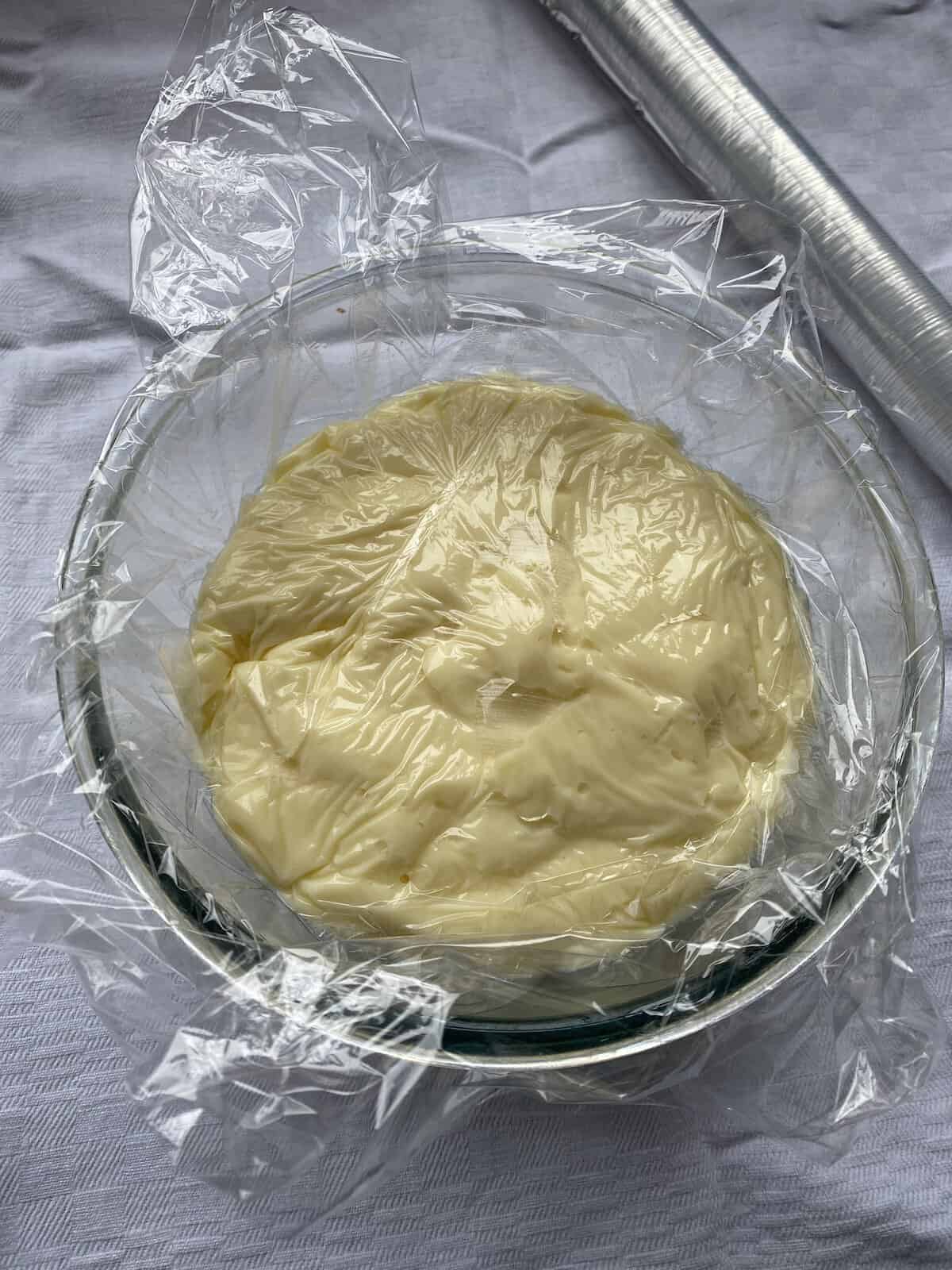
When the custard has thickened, pour it into a clean, heat-proof dish and leave it to cool completely.
TIP: Place a sheet of clingfilm over the top of the custard surface to help prevent skin from forming.
Place the custard in the fridge if you plan to make the Manchester tart the next day. You may need to mix it before spreading it into the pastry case.
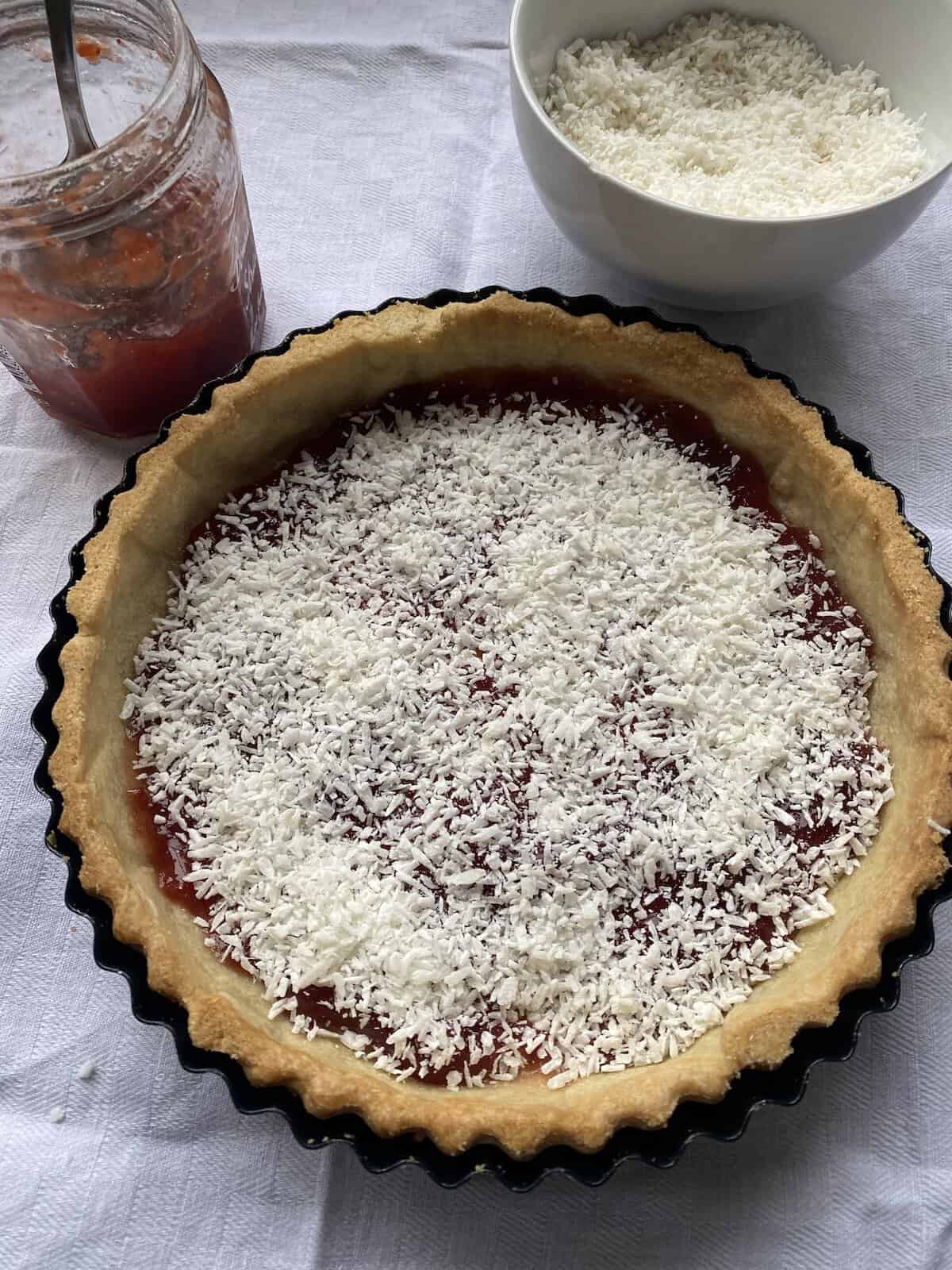
When the pastry tart has cooled completely, spread the base with the jam and scatter half of the coconut over the top.
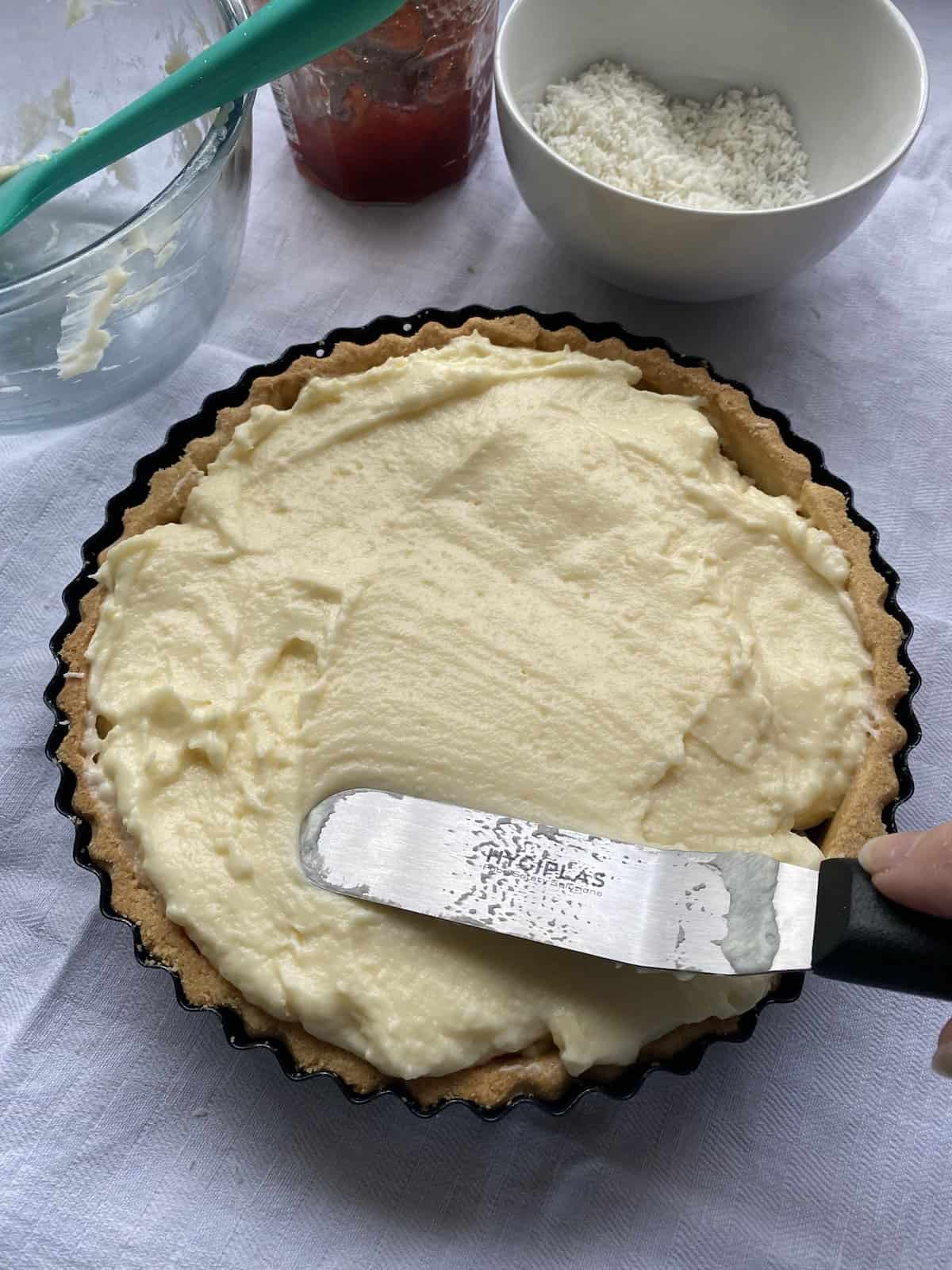
Spread the cold, thick custard over the top of the jam and coconut.

Sprinkle the top with the remaining coconut and decorate with Glace cherries. Place the tart in the fridge for a few minutes to set and firm up before slicing.
Equipment
- Food Processor - I find using a food processor to make shortcrust pastry a lot easier, especially in warm weather or if your hands are warm. It's also quicker. But if you prefer, you can use the rub-in method with your fingertips.
- Tart Tin - Fluted tart tins give a nice decorative pastry edging. Using one with a loose bottom makes it easy to remove the pastry when baked, and the filling has set.
Storage
- Fridge - A tart like this will stay fresh in the fridge for a couple of days.
- Freezer - I doubt this is suitable for freezing as custard filling may crack, and some of the water from the milk and cream solids may ooze out thawed.
Tips and Faq
- Using a loose bottom tin will make it easier to remove the tart when the pastry is baked.
- When making the pastry, add the water a little at a time until you reach the desired consistency. Don't add all at once as you may not need it all.
- Lumpy custard will soon thicken if you take it off the heat and give it a good mix.
- Freeze any excess pastry to use another time. Wrap in baking parchment or freezer bag. Remember to add a label with the date and type of pastry - sweet or savoury.
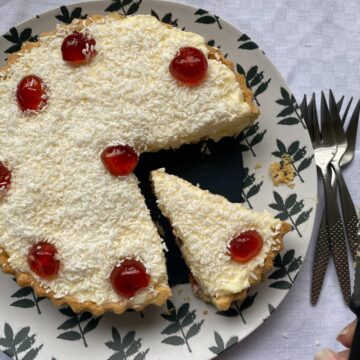
Manchester Tart without Banana
Equipment
- Food processor Optional
- 1 Tart Tin 20cm/8inch with a loose bottom.
Ingredients
For the Basic all butter Shortcrust Pastry
- 200 g
plain white All purpose flour
- 100 g butter fridge cold cut. into cubes
- 1 whole medium egg
- 2 teaspoons cold water You may not need it all.
For the Thick Rich Custard
- 3 medium egg yolks freeze the egg whites to make meringues.
- 50 g caster sugar
- 1 teaspoons vanilla extract.
- 30 g corn flour or plain flour
- 150 ml single cream double cream is fine.
- 300 ml whole milk
For the Filling
- 100 g Strawberry Jam
- 50 g desiccated coconut
- Glace Cherries
Instructions
- Grease a 20cm/8inch fluted loose-bottomed tart tin approx 1.25 inch/3.5 cm deep.
Make the All Butter Shortcrust Pastry
- Blitz together the flour 200 g
plain white All purpose flour
and butter 100 g butter in a food processor until you have a fine breadcrumb consistency. Use your fingertips and the 'Rub In' method if you don't have a food processor. - Add the egg 1 whole medium egg and enough water 2 teaspoons cold water to bring the pastry to a smooth, firm dough.
- Flatten the dough a little, then wrap it in cling film or baking parchment and place it in the fridge for at least 30 minutes to rest and firm up. TIP: The pastry can remain in the fridge overnight or for a few days if you want to make the tart later.
- Roll out the pastry between two sheets of baking parchment or a lightly floured surface to fit the size of the tart tin and no more than ⅛th inch 2-3 mm thick.
- Fit the pastry into the tart tin, using your fingers to get into the corners. Let the pastry overlap the edges.
- Remove the excess pastry by cutting through the top of the tart tin with your rolling pin. Tip. Wrap and freeze the excess pastry to use another time. Use it as a pie topping or small tarts or pies.
- Neaten the edges and sides using your thumb and fingertips, allowing the pastry to lift slightly above the top edges of the tin. This allows for a small amount of shrinkage during baking.
- Make small holes, with a fork, in the base of the pastry dough. Cover the pastry with baking parchment and return to the fridge to rest again for about 30 minutes.
- Preheat the oven to 200c in a fan oven and place a baking tray on the middle shelf to heat up.
- When ready to bake, remove the pastry case from the fridge and cover the baking parchment with baking beans.
- Bake on the preheated baking tray for 20 minutes or until the pastry is cooked and feels dry when touched.
- Remove the baking beans and parchment, and return to the oven for a few more minutes until the pastry is slightly golden. Leave in the tin to cool completely.
- Pro tip: To neaten the edges further, use a small serrated knife and carefully file away the top edges of the pastry case. Take care not to break any of the tart casing.
Make the Thick Custard Filling
- While the shortcrust pastry tart is baking, now is the time to make the thick custard.
- In a large bowl, beat together the egg yolks 3 medium egg yolks, sugar 50 g caster sugar and vanilla extract 1 teaspoons vanilla extract. until light in colour. Add the cornflour 30 g corn flour or plain flour and mix until well combined.
- Heat the cream 150 ml single cream and milk 300 ml whole milk to just below boiling point in a small pan, then carefully pour this into the bowl containing the egg and sugar mixture. Mix until well combined.
- Pour the custard back into a clean pan, stirring continuously with a spatula, and bring the custard slowly to a simmer. It will soon begin to thicken.
- As it thickens, take off the heat and stir until you have a smooth custard. If needed, return to the heat to thicken further while stirring continuously.
- TIP: Test for thickness by spreading your finger over the back of a spoon.
- When the custard has thickened, pour it into a clean, heat-proof dish and leave it to cool completely.
- TIP: Place a sheet of clingfilm over the top of the custard surface to help prevent skin from forming.
- Place the custard in the fridge if you plan to make the Manchester tart the next day. You may need to give it a mix before spreading it into the pastry case.
- When the pastry tart has cooled completely, spread the base with the jam 100 g Strawberry Jam and scatter half of the coconut 50 g desiccated coconut over the top.
- Spread the cold, thick custard over the top of the jam and coconut.
- Sprinkle the top with the remaining coconut and decorate with Glace cherries. Place the tart in the fridge for a few minutes to set and firm up before slicing.
Notes
Freezer - I doubt this is suitable for freezing as custard filling may crack and some of the water from the milk and cream solids may ooze out thawed. Tips and Faq
- Using a loose bottom tin will make it easier to remove the tart when the pastry is baked.
- When making the pastry, add the water a little at a time until you reach the desired consistency. Don't add all at once as you may not need it all.
- Lumpy custard will soon thicken if you take it off the heat and give it a good mix.
- Freeze any excess pastry to use another time. Wrap in baking parchment or freezer bag. Remember to add a label with the date and type of pastry - sweet or savoury.
- I find using a food processor to make shortcrust pastry a lot easier, especially in warm weather or if your hands are warm. It's also quicker. But if you prefer, you can use the rub-in method with your fingertips.
- Fluted tart tins give a nice decorative pastry edging. Using one with a loose bottom makes it easy to remove the pastry when baked, and the filling has set.

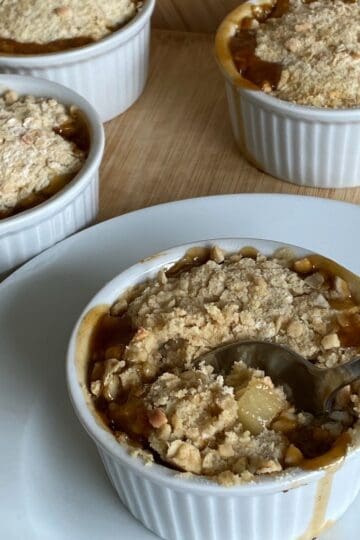
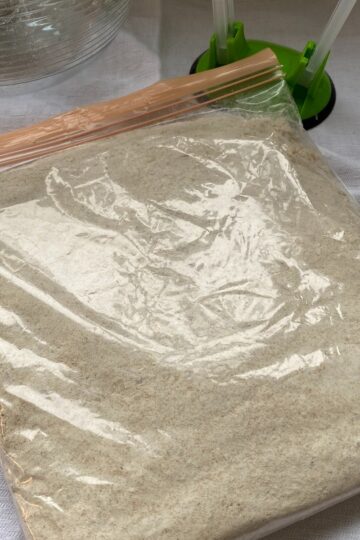
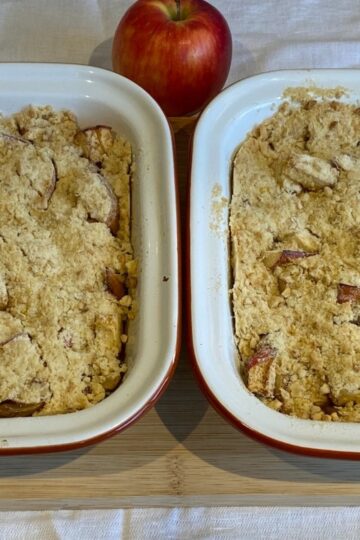
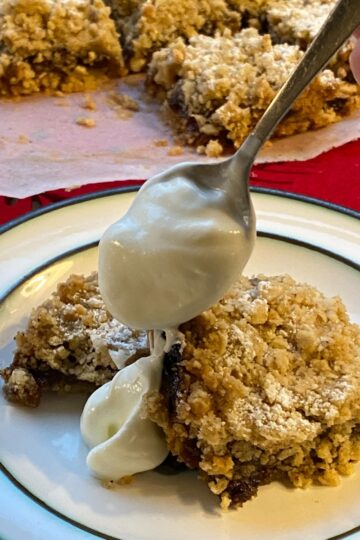
Comments
No Comments